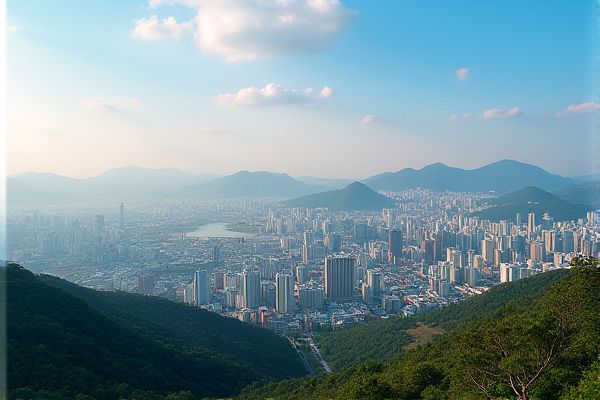
Housing market and best cities to live in South Korea: Seoul: High demand, vibrant city life. Busan: Coastal views, affordable options. Incheon: Proximity to Seoul, developing rapidly. Daegu: Historical sites, growing tech industry. Daejeon: Science hub, educational institutions. Gwangju: Cultural events, art scene thriving. Jeonju: Traditional charm, culinary delights. Suwon: Strong economy, historical landmarks. Ulsan: Industrial city, job opportunities. Jeju Island: Tourist hotspot, natural beauty.
Seoul: High demand, vibrant city life.
Seoul's housing market is experiencing high demand and rising prices, with the government planning to supply 236,000 new homes at lower-than-market prices by 2029 to address the issue. The city offers a vibrant city life with various neighborhoods like Gangnam, Itaewon, and Hongdae, known for their upscale amenities, artsy vibe, and nightlife. For more detailed insights regarding this development, you can visit the Korea Times website. This initiative aims to curb the skyrocketing housing costs and provide more affordable solutions for residents, making Seoul an even more attractive hub for both locals and expatriates.
Busan: Coastal views, affordable options.
Busan is a desirable city for its coastal views, affordable cost of living, and a more relaxed pace of life, offering amenities of a big city including beautiful beaches, mountains, and a thriving expat community, along with a vibrant seafood scene and cultural attractions like the Gamcheon Culture Village.
Incheon: Proximity to Seoul, developing rapidly.
Incheon is an attractive option due to its proximity to Seoul, being only 27 kilometers away, and is developing rapidly with steady demand for residential properties driven by urbanization and government initiatives to increase housing availability. For more insights, visit the comprehensive overview at South Korea's Real Estate Market, which provides an in-depth look into future trends and key investment areas in this dynamic region.
Daegu: Historical sites, growing tech industry.
Daegu is a city rich in historical sites, including the Daegu Modern History Street, which features walking paths through the city's oldest historical sites such as Jong-ro, Jeil Church, and Gyesan Cathedral. While Daegu is not as prominently known for its tech industry as cities like Seoul, it still offers a unique blend of historical significance and potential for growth, making it an attractive option for those interested in both history and a more laid-back urban lifestyle. For more insights, you can explore the details on Daegu's Modern History Street.
Daejeon: Science hub, educational institutions.
Daejeon is a prominent science hub and educational center in South Korea, home to institutions like Daejeon Institute of Science & Technology and other notable universities such as KAIST and Chungnam National University. The city boasts a strong R&D environment with numerous government-funded research institutes and private R&D centers, making it an attractive location for those interested in science, technology, and education.
Gwangju: Cultural events, art scene thriving.
Gwangju is renowned for its vibrant cultural scene, particularly highlighted by the Gwangju Biennale, a prestigious biennial contemporary art exhibition, and the city's thriving art community, making it an attractive place to live for those who appreciate art and culture.
Jeonju: Traditional charm, culinary delights.
Jeonju offers a unique blend of traditional charm and culinary delights, with its Hanok Village showcasing well-preserved traditional homes, cultural facilities, and a rich culinary scene featuring dishes like Jeonju Bibimbap and Kongnamul Gukbap, making it an attractive city to live in for those who value cultural heritage and authentic Korean experiences. For more insights on this captivating location, visit Urban Land.
Suwon: Strong economy, historical landmarks.
Suwon is notable for its strong historical significance, particularly with the UNESCO World Heritage Site of Hwaseong Fortress, built from 1794 to 1796. While it was one of the main regional government centers during the Joseon dynasty, its economic power and historical landmarks make it an attractive place to live. For more detailed insights into Suwon's attractions, visit the Visit Korea website. However, specific economic data on its housing market is not detailed in this source.
Ulsan: Industrial city, job opportunities.
Ulsan, although not extensively detailed in the source, is known as an industrial city in South Korea, particularly famous for its heavy industries such as shipbuilding and automotive manufacturing, which provides significant job opportunities, especially in sectors like Hyundai Heavy Industries and Hyundai Motor Group. However, for a more comprehensive lifestyle, cities like Seoul, Busan, and Incheon are often highlighted for their balanced mix of job opportunities, amenities, and quality of life. Discover more about the lifestyle and living experiences in Korea through this insightful article from Invest Asian.
Jeju Island: Tourist hotspot, natural beauty.
Jeju Island is a prominent tourist hotspot known for its stunning natural beauty, featuring attractions like Hallasan National Park, Manjanggul Cave, Jeongbang Waterfall, and Hyeopjae Beach, making it an ideal location for those who appreciate scenic landscapes and unique cultural heritage. However, in terms of the housing market, Jeju Island is not specifically highlighted as a major residential hub, but its natural beauty and tourist attractions contribute to its appeal for living. To learn more about these enchanting sites, visit the Ultimate Guide to Jeju Island's Top Tourist Attractions which delves deeper into what makes Jeju a captivating destination for travelers around the globe.
